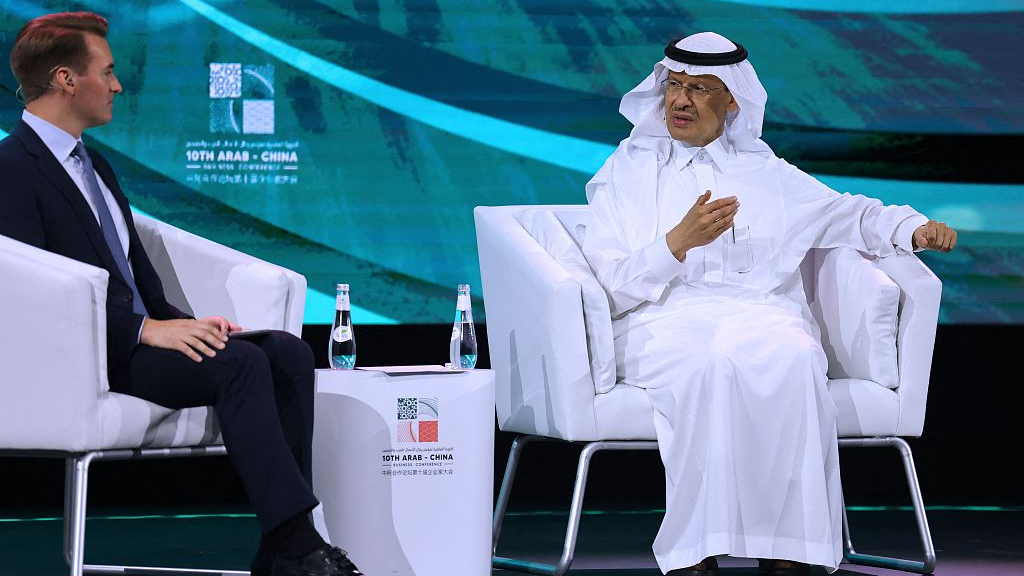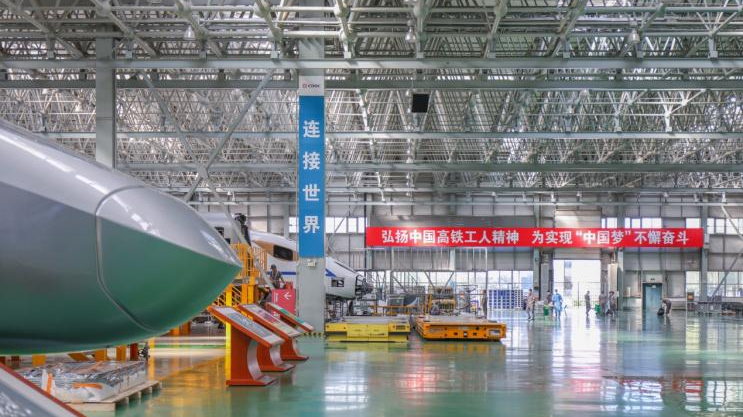
Saudi Energy Minister Prince Abdulaziz bin Salman speaks during a panel discussion at the 10th Arab-China Business Conference in Riyadh, Saudi Arabia, June 11, 2023. /CFP
Saudi Energy Minister Prince Abdulaziz bin Salman speaks during a panel discussion at the 10th Arab-China Business Conference in Riyadh, Saudi Arabia, June 11, 2023. /CFP
Editor's note: Shahid Hussain, a special commentator on current affairs for CGTN, is the founder and CEO of the UAE-based company Green Proposition. The article reflects the author's opinions, and not necessarily the views of CGTN.
In recent years, the burgeoning partnership between China and the Arab world has heralded a new era characterized by mutual respect and fruitful collaboration. The recent 10th Arab-China Business Conference, held in Riyadh, showcased the remarkable progress in this partnership, as 30 investment agreements worth a staggering $10 billion were signed on the first day. These agreements, spanning various sectors such as technology, renewables, agriculture, real estate, minerals, supply chains, tourism, and healthcare, exemplify the extensive and diverse nature of cooperation between these two regions.
The significance of these agreements cannot be overstated. They signify a shift from mere economic transactions to comprehensive partnerships that encompass research, development, manufacturing, sales, and joint ventures. Among the noteworthy deals signed during the conference was the remarkable $5.6 billion agreement between Saudi Arabia's Ministry of Investment and Human Horizons, a leading Chinese developer of autonomous driving technologies and electric cars. This collaboration in the automotive industry symbolizes the commitment of both sides to embrace technological advancements and explore new avenues of growth.
Moreover, the agreements in sectors such as tourism, rail manufacturing, and chemical production highlight the breadth of cooperation between China and the Arab world. For instance, the $266 million deal between Saudi Arabia and Hibobi Technology Ltd., an esteemed Android developer based in Hong Kong, will pave the way for the development of tourism and other innovative applications. This partnership exemplifies the commitment of both sides to harness digital technologies to enhance the tourism sector, an area of immense importance to both China and the Arab world.

A high-speed train workshop in CRRC Changchun Railway Vehicle, Changchun City, Jilin Province, China. /CGTN
A high-speed train workshop in CRRC Changchun Railway Vehicle, Changchun City, Jilin Province, China. /CGTN
Another significant agreement worth $250 million, facilitated by Saudi Arabia's Ministry of Investment, brought together SABATCO, a prominent Saudi railway company, and CRRC, a leading Chinese rolling stock manufacturer. This collaboration aims to manufacture rail wagons and wheels in Saudi Arabia, underlining the shared interest in enhancing transportation infrastructure and connectivity. Such projects not only contribute to economic development but also serve the broader goals of China's Belt and Road Initiative and Saudi Arabia's Vision 2030 reform plan.
The success of these partnerships is founded upon the inherent synergies between China and the Arab world. Both regions possess unique strengths that, when combined, create a powerful force for economic growth and innovation. China's technological prowess, manufacturing capabilities, and robust investment capital find fertile ground in the Arab world's abundant resources, strategic location, and unwavering commitment to economic diversification. This mutual respect and recognition of each other's potential have laid the groundwork for collaborative efforts that drive sustainable development and shared prosperity.
As aptly emphasized by Saudi Energy Minister Prince Abdulaziz bin Salman, the focus lies on collaboration rather than competition. China, as the world's second-largest economy, and Saudi Arabia, with its ambitious Vision 2030 plan, envision long-term growth and prosperity. By aligning their objectives and pooling resources, the two regions can unlock tremendous potential and pave the way for a brighter future.
The bilateral trade volume between Saudi Arabia and China, amounting to a remarkable $106 billion in 2022, serves as a testament to the growing economic ties and the immense potential for further expansion. Furthermore, the recent announcement by Saudi Arabia regarding the revival of the Silk Route underscores the ambition to strengthen trade ties with China. As the Silk Route resurges as a key economic artery, Saudi Arabia has positioned itself as China's gateway to the Arab world. This strategic move not only capitalizes on the historical trade routes but also aligns seamlessly with Saudi Arabia's vision of economic diversification and embracement of modern technology.
President Xi Jinping's visionary concept of a community with a shared future for mankind resonates profoundly in the ongoing development of China-Arab world relations. Through mutual respect and unwavering dedication to common goals, they are nurturing an unbreakable bond that transcends time and will undoubtedly leave a profound and lasting legacy for future generations.
(If you want to contribute and have specific expertise, please contact us at opinions@cgtn.com. Follow @thouse_opinions on Twitter to discover the latest commentaries in the CGTN Opinion Section.)